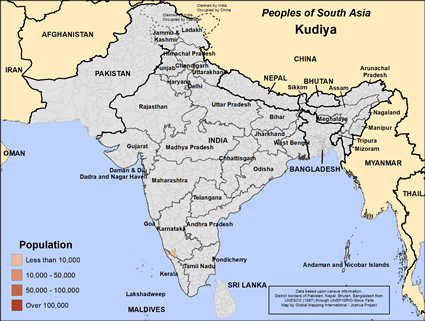The Kudiya people live in India, primarily in the southern state of Karnataka where they speak their own language of Kudiya. Their history is closely tied to the Western Ghats, a region where they have traditionally engaged in agriculture and forest-based activities. The Kudiya have a long-standing connection to the land, which has shaped their way of life and their interactions with the natural environment. Over time, they have adapted to various socio-political changes while maintaining a distinct identity within the region.
The Kudiya people primarily engage in subsistence agriculture, cultivating crops such as rice, millet and vegetables. They also rely on the collection of forest products, including honey, medicinal plants and timber which they use for both sustenance and trade. Their villages are typically small, with homes constructed from locally available materials like mud, bamboo and thatch.
Social life revolves around family and community, with cooperation being essential for agricultural and forest activities. Access to education has improved, but many Kudiya children still face challenges in continuing their studies due to economic constraints and limited educational facilities in remote areas. Healthcare services are often inadequate, leading to a reliance on traditional medicine and local healers.
The Kudiya people practice a blend of animism and Hinduism. They believe in spirits associated with nature, such as those inhabiting forests, rivers, and mountains, and conduct rituals to honor these spirits and ensure harmony with the natural world. They also worship Hindu deities, with particular reverence for gods and goddesses connected to agriculture and fertility. Festivals and ceremonies are central to their spiritual life, often involving the entire community in rituals that mark significant life events and seasonal cycles.
The Kudiya people face challenges related to economic opportunities, education and healthcare. Many continue to rely on subsistence farming and forest resources, with limited access to alternative livelihoods. Educational facilities, while improving, are often inadequate in rural areas, leading to low literacy rates and limited access to formal education. Healthcare services are scarce, particularly in remote areas, resulting in poor health outcomes and a reliance on traditional practices that may not always meet modern health needs. Infrastructure improvements, such as better roads, clean water supply, and access to electricity, are essential for enhancing their quality of life. Initiatives focused on sustainable development, education, and healthcare access are crucial for the long-term development of the Kudiya people.
Pray for Kudiya leaders to understand from the heart that there is no forgiveness of sin apart from Jesus Christ. Pray that leaders in this people group will seek righteousness and spiritual strength from Jesus Christ and teach others to do the same. Pray for the Lord to deliver the Kudiya people from the bondage of fear and replace it with freedom in Christ and a willingness to offer other communities the way and the truth.
Scripture Prayers for the Kudiya in India.
Karnataka Tribal Research. (2023). Ethnographic Overview of the Kudiya People. Retrieved from karnatakatribalresearch.org
UNDP India. (2023). Development Needs of Rural Communities in Karnataka. Retrieved from in.undp.org
https://en.wikisource.o
| Profile Source: Joshua Project |











